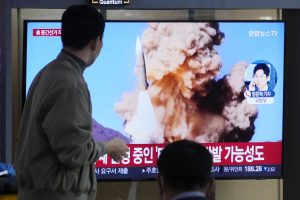Relations both between the United States and North Korea and between North and South Korea have long been at a stalemate, with the mood for dialogue that existed in 2018-2019 now entirely a thing of the past. Gone are the days when North Korean leader Kim Jong Un himself would talk about “denuclearization,” even if superficially. Today, North and South Korea are locked in an arms race.
The conservative government of President Yoon Suk-yeol was inaugurated in South Korea in May 2022. Since the start of the year, North Korea has been increasing the frequency of its missile tests, and nuclear missile development is clearly now its default course. This is based on a medium-term strategy that is a “five-year plan to develop a national defense science and weapons system,” which was adopted at the 8th Congress of the Workers’ Party of Korea in January 2021.
Yoon is maintaining a hardline stance on North Korea and is emphasizing the importance of the U.S.-South Korea alliance. Yoon is a former prosecutor general with no parliamentary experience; his diplomatic and security advisors are closely aligned with the earlier Lee Myung-bak administration. It follows then, that, the Seoul’s policy toward North Korea is little changed from that of the Lee administration. The “audacious initiative” Yoon presented in August was to provide step-by-step assistance such as food and medical infrastructure depending on the status of North Korea’s denuclearization. Pyongyang dismissed it as an “arrogant” policy reminiscent of the failures of the Lee administration. The fact remains that movement on inter-Korean relations is difficult in the absence of progress in U.S.-North Korea, as is evident from the failures of inter-Korean dialogue under the Moon Jae-in administration.
Former South Korean President Lee Myung-bak came to power in 2008 advocating “Vision 3000: Denuclearization and Openness,” which aimed to help North Korea reach $3,000 per capita income within 10 years if it opened up and adopted denuclearization. Hopes for this policy ended in 2010 when North Korea sank the ROKS Cheonan and shelled Yeonpyeong, two acts that cost South Korean lives. Both of these provocations took place when Kim Jong Il was leader, but there have been persistent suggestions that Kim Jong Un, who had just been named successor, was the one who actually ordered them.
Lee’s failure to hold an inter-Korean summit should not be repeated. Yet for now, the possibility of North Korea attempting once again to strike South Korea directly cannot be dismissed. After all, the means of retaliation that the United States and South Korea have at their disposal against North Korea, a de facto nuclear power, are limited.
North Korea is focusing on developing short-range missiles, including hypersonic missiles that are difficult to intercept because signs of their impending launch are hard to detect. There is no doubt that if and when negotiations with the United States resume, the first thing that Washington will demand to be dismantled will be any ICBMs that can reach the U.S. mainland. Whether this happens after the Biden administration, as Pyongyang assumes, the North Koreans have determined that they should focus on preparing for actual combat by investing in the development of missiles that can reach U.S. forces in South Korea, Japan, and Guam.
Speaking at the military parade held in Pyongyang earlier this year to mark the anniversary of the founding of the Korean People’s Revolutionary Army, Kim Jong Un personally reversed his previous claim that nuclear weapons are a “deterrence,” saying that they have a “second mission,” hinting at the use of tactical nuclear weapons.
Earlier, in October last year, Kim had said that “our main enemy is war itself, not any particular state or power, such as South Korea or the United States.” Belying those words, North Korea has adopted a hostile posture toward the United States and even South Korea since the start of the year. Kim has declared South Korea’s deepening cooperation on security with the United States and Japan as a “provocation.” These hardline remarks have been widely reported in North Korea through the Rodong Sinmun and Korean Central Television, as a signal to the North Korean people not to expect diplomatic progress in the near future.
The invasion of Ukraine, which does not possess nuclear weapons, by nuclear-armed Russia would likely have offered further stimulus for Pyongyang to strengthen its national defense capabilities, and unless the United States decides to make significant concessions to North Korea, Kim will continue its current nuclear weapons policy. In South Korea, Yoon’s approval rating has not only languished on inflation and poor personnel management, his government is finding it difficult to get anything done since it will be a minority ruling party until the general election in April 2024 at the earliest. Seoul cannot waiver in its hardline stance against North Korea, which includes responding when missiles are launched, since it needs to solidify support from domestic conservatives. Ultimately, though, this approach will only encourage further North Korean provocations.

































